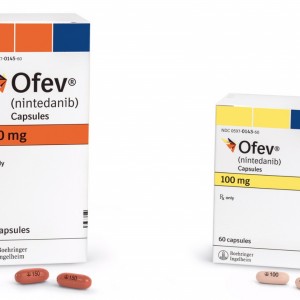European Commission Approves Boehringer’s OFEV to Treat IPF

 The European Commission (EC) has approved Boehringer Ingelheim‘s application for the commercialization of the drug nintedanib, for the treatment of idiopathic pulmonary fibrosis (IPF), within the European Union. Under the brand name Ofev, the drug therapy was approved by the EC due to an expedited review and positive opinion granted by the Committee for Medicinal Products for Human Use (CHMP) this past November.
The European Commission (EC) has approved Boehringer Ingelheim‘s application for the commercialization of the drug nintedanib, for the treatment of idiopathic pulmonary fibrosis (IPF), within the European Union. Under the brand name Ofev, the drug therapy was approved by the EC due to an expedited review and positive opinion granted by the Committee for Medicinal Products for Human Use (CHMP) this past November.
Boehringer Ingelheim will now be able to commercialize Ofev in the European Union countries, as announced by the company in a press release. The approval is not only a milestone for Boehringer Ingelheim, but also makes another effective treatment option available for patients in the Eurozone who suffer from IPF, a debilitating and life-threatening disease of the lungs that has a survival rate of two to three years on average, after diagnosis.
“Approval of this treatment for patients in the EU is a significant step towards meeting the substantial unmet need in IPF,” said the chief medical officer at Boehringer Ingelheim, professor Klaus Dugi. “Patients suffering from this chronic, debilitating disease can now be offered a new treatment option that has been shown to have a clinically meaningful effect on their disease.”
“This approval is another milestone in Boehringer Ingelheim’s ongoing efforts with regard to innovation in rare diseases in general and our continuing research for the benefit of patients affected by such a dreadful disease as IPF in particular,” Dugi added.
In addition to the CHMP recommendation, the decision was based on the results from the Phase III INPULSIS trials, which enrolled 1,066 patients in 24 international study centers. The findings of the trials suggested nintedanib’s capacity in slowing the progression of the disease, as the drug is able to decrease the annual rate of lung function decline by half. The results were verified in a series of IPF types, including early disease, limited radiographic fibrosis on high resolution computed tomography (HRCT) and patients with emphysema.
[adrotate group=”3″]
“Until recently, treatment options for patients with IPF were limited,” explained the study investigator Luca Richeldi, who is a professor of Respiratory Medicine, and chair of Interstitial Lung Disease at the University of Southampton, United Kingdom. “The approval of nintedanib in the EU gives patients with a life threatening illness a choice of therapy with proven efficacy.”
“Clinical data demonstrate that nintedanib reduces the annual decline of lung function by approximately half. Data also showed that nintedanib reduced the risk of acute exacerbations, which can lead to hospitalization and death,” the researcher added.
The drug therapy, comprised of a capsule taken twice a day, has become the first targeted treatment for IPF able to meet the primary endpoint in two identically designed Phase III trials. In addition, nintedanib was able to decrease the adjudicated acute exacerbations probability by 68%.
“It’s great that there is now a choice of treatments for IPF patients. This approval provides important hope for patients and caregivers living with this awful disease,” said Toby Maher, MD, Consultant Respiratory Physician at the Royal Brompton Hospital in London, United Kingdom, about the approval.






